






We’ve put together this guide to help you settle (or settle back) into life in Cornwall.
You can find advice, support and information on every aspect of student life that will be helpful throughout the year, not just the start of term.
We have tried to signpost you to all the student support services that are available to you, from wellbeing resources and the education welfare team through to help with study, academic skills, accessibility and living off campus. At the back of the guide you’ll also find a list of useful contacts for the University and beyond.
You might find it helpful to keep this guide handy so you can dip into it whenever needed.
We wish you the best of luck for your new academic year.
Register with a doctor in Cornwall
We recommend all students register with a doctor (GP). The Penryn Surgery serves the campus, visit penryn.co.uk/universitystudents to register online. If you’re living off campus you can find details of local doctors’ surgeries at exeter.ac.uk/ students/wellbeing/cornwall/ resources/doctors
Try the NHS App
The NHS App is an easy way to order repeat prescriptions, use NHS 111 online, find NHS services, view your GP health record and more. Visit: nhs.uk/nhs-app
Check your vaccines are up to date
Mixing with other students can mean you are more at risk of infectious diseases, so please ensure you are fully up to date with your jabs. These could include Covid-19 vaccinations, flu jabs or others such as the MenACWY vaccine to help protect against certain types of meningitis.
Have you had your MMR (Measles Mumps and Rubella) jabs?
Measles spreads extremely easily among those who are unvaccinated and, in some people, can lead to hospitalisation. Contact your GP Practice (Doctors’ Surgery) to check if you have had both MMR doses. It is never too late to catch up. The MMR vaccine is free on the NHS, whatever your age.
Be aware of the signs
It’s important to be aware of the signs and symptoms of infections like meningitis and
measles, so you can seek medical advice if you become concerned. If you feel unwell, try and stay at home and avoid mixing with friends so that you don’t spread any germs, particularly to those who might be more vulnerable than you.
Measles: nhs.uk/conditions/measles
Mumps: nhs.uk/conditions/mumps
Meningitis: nhs.uk/conditions/meningitis
Meningitis is a life-threatening condition, so it’s important to make sure you’re vaccinated. Symptoms can appear in any order. Some may not appear at all. Early symptoms can include fever with cold hands and feet, headache, vomiting, diarrhoea, muscle pain and stomach cramps.
Look after your sexual health
Every time you have sex, you could get a sexually transmitted infection (STI). STIs such as gonorrhoea and syphilis have been on the rise across the UK in recent years.
Condoms can protect against STIs and you can get free ones up to the age of 24 with a C-Card, from Brook – Sexual Health Cornwall sexualhealthcornwall.co.uk/ more-services/c-card. If you’re aged over 24 condoms are available from any Brook Clinic sexualhealthcornwall. co.uk/visit-clinic, via The Eddystone Trust eddystone.org.uk/pages/condomsdirect or you can buy them low cost from freedoms-shop.com. You can also pick up free condoms and other protection from The SU.

Peer support is designed to be a safe space where people, who have similar experiences, can come together to support each other. The following groups meet locally or on Penryn Campus:
Man Down Cornwall
For men who are struggling with any kind of mental health issues.
Intercom Trust
A social space to discuss LGBTQ+ student life.
Georgia’s Voice
For young women with mental health concerns.
Let’s Talk About Loss
A group for students who have been affected by bereavement.
For further information on peer support groups visit: exeter.ac.uk/ students/wellbeing/ cornwall/resources/ peer-support
You can access a variety of resources to help you manage your wellbeing during your time with us. These include:
Student Services
Student Services provides a range of specialist support, information and guidance on welfare, wellbeing (including mental health support), disabled student support, and general student life advice. Services are available at the Penryn and Truro campuses.
You can access them through The Compass Helpdesk on 01326 370460, studentservices@fxplus.ac.uk or online at exeter.ac.uk/students/wellbeing/cornwall/ appointments
Drop-in appointments
The Student Support team is part of Student Services and is here to help you manage your mental health and wellbeing so you can make the most of your student life and your studies.
To request a drop-in
n Use The Compass web chat at fxplus.ac.uk/ student-support/the-compass
n Email studentservices@fxplus.ac.uk
n Call 01326 370460
n Visit The Compass Helpdesk based in the Penryn Campus Library
Find more information at exeter.ac.uk/students/wellbeing/ cornwall/appointments
You can find more information on Wellbeing support in Cornwall at: exeter.ac.uk/students/wellbeing/ cornwall
This free confidential service for students in Cornwall gives you access to talking therapies without the need for a referral. They also provide a 24/7 helpline for immediate confidential advice and support.
You can contact them:
n By phone
From the UK: 0800 031 8227
From outside the UK: 00353 1 518 0277
n On WhatsApp: Text “Hi” to 07418 360780
Visit exeter.ac.uk/students/wellbeing/cornwall/ resources/spectrum-life

Explore more resources and support including online community Togetherall, Silvercloud online mental health programme, Men’s Mental Health Resources and our Wellbeing Toolkit at exeter.ac.uk/students/wellbeing/ cornwall/resources

Not sure what you need?
The Compass is a student information service offering help and advice on any aspect of university life – whether you have a quick query or require specialist support.
Visit The Compass Helpdesk on Level 1 of The Exchange Building, email: studentservices@fxplus.ac.uk, call: 01326 370460 or visit: fxplus.ac.uk/
student-support/the-compass for further information and access to the webchat.
Our Accessibility and Inclusive Learning team within Student Services supports and advises you if you have a disability, long-term health condition, autism or other specific learning differences. They can help if you need adjustments to be made to accommodation, teaching methods or exam arrangements.
Email accessbility@fxplus.ac.uk or visit studyhub.fxplus.ac.uk/accessibilityinclusion
Our Education Welfare Team can support you during your studies. They can help you if your mental or physical health is affecting your ability to learn or your study is creating health problems for you. They can talk to you in a confidential and non-judgemental way about any issues you may need support with.
Email welfare.penryn@exeter.ac.uk or find more information at exeter.ac.uk/students/ wellbeing/cornwall/education
You will find a welcoming and supportive space at the Multifaith Chaplaincy which is open to students of all faiths or none. The Chaplaincy team can support you to practice your religion or spirituality on and off campus and manages spaces for you to enjoy.
On Penryn Campus this is in Tremough Barton Cottage 8, which has space to worship, pray, meditate or relax. There’s also a Muslim prayer room with dedicated washing facilities and space for men and women to pray in Tremough House. This is open 24/7 throughout the year. Chaplaincy activities are normally listed at fxplus.ac.uk/ events-on-campus
You can also visit fxplus.ac.uk/ student-support/multifaithchaplaincy or follow Instagram @multifaithchaplaincy
The ResLife team hosts a calendar of social activities for students living in halls of residence, both on and off campus. They are a friendly face in halls for signposting you to wellbeing and support.
Email: ResLife@fxplus.ac.uk For updates follow @fxreslife @FXResLife
Exeter Cares is designed for students who are care experienced, mature students, students with caring responsibilities, students who are estranged from their parents/carers and student refugees. The Exeter Cares Team is made up of staff from the Access, Participation and Outreach Team and Wellbeing teams. They offer practical help such as accessing financial advice or funding, and wellbeing support.
Exeter Cares network sends a termly newsletter signposting to events. To find out how they can support you email exeter-cares@exeter.ac.uk or visit exeter.ac.uk/students/ wp-support
The Falmouth and Exeter Students’ Union (The SU) can also provide confidential and unbiased guidance and support with any academic or wellbeing issues. Email: info@thesu.org.uk or visit: thesu.org.uk/advice


In an emergency dial 999 and ask for the police, ambulance or fire service.
For non-emergencies call NHS on 111 for medical help or the police on 101.
In cases of overdoses and serious injury through selfharm you must seek immediate medical help by calling 999, even if you, or the person you are with, feels well.
In an emergency at the coast dial 999 and ask for the coastguard.
If you are having suicidal thoughts and intend to act on them imminently, you should call 999 and ask for an ambulance.
In Cornwall, you can also call the local NHS urgent mental health helpline free on 0800 038 5300, any time of the day or night.
exeter.ac.uk/students/wellbeing/ cornwall/urgentsupport
Falmouth and Exeter Students’ Union (The SU) works to ensure that every student has the highest quality education and the best student experience possible. All students on our Cornwall Campuses are automatically members of The SU.
The union represents your views and values through elected course reps, student council members and your students’ union presidents and vice presidents. They make sure all student voices are heard, striking up conversations, and supporting student run projects to improve your experience.
With more than 120 sports clubs and societies there’s something for everyone to get involved with, from competitive sports clubs and academic societies to creative groups and social meet-ups.
Your membership of the SU gives you access to their independent advice service if you need help with finances, housing, academic issues and university life.
For more information head to thesu.org.uk or follow



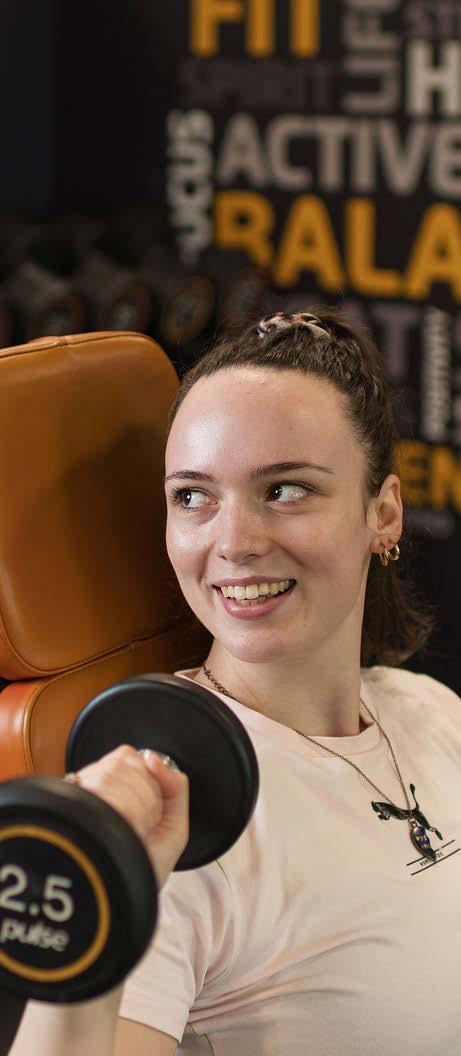
The Sports Centre at Penryn Campus has a 90-station gym with qualified Fitness Advisors to provide advice and guidance. The studio offers over 40 weekly classes, including Bodypump and Bodycombat, Spinning, Yoga and Pilates. You can get a membership or ‘pay as you go’. There is also a Sports Hall and the outdoor Multi-Use Games Area, (MUGA) on campus.
Opening hours for all facilities: Monday to Friday 06:30-22:00, weekend and bank holidays 08:30-18:00.
For more information visit fxplus.ac.uk/facilities-services/ flexsi-sports-centre email: sportscentre@fxplus.ac.uk or phone 01326 370770
The Penryn Campus parkrun takes place every Saturday at 09:00, starting outside Tremough House. This is a free, friendly, inclusive event where you can run, walk or jog the 5K route at your own speed.
For more information, visit parkrun.org.uk/penryncampus or email penryncampus@parkrun.com

Your careers and employability experts.
You can see the Career Zone team as often as you like –no question is too small and you don’t need to have any clear career ideas before speaking to them, that’s what they’re here for.
They can help with CV advice, finding a part-time job, guidance for interviews and how to apply for graduate jobs or postgraduate study.
Activate your Handshake account at exeter.joinhandshake.co.uk to browse and apply for placements, internships and graduate jobs. You can also use Handshake to find events with employers, skills sessions and careers fairs.
To stay up to date on career opportunities look out for their weekly email or follow:
@uoecornwallcareerzone

@uoecareerzone



International students, you can find guidance on part-time work here: exeter.ac.uk/careers/ jobsandworkplacements/ internationalstudents/parttimeworkduringyourstudies
The Career Zone can help you find work if you are looking for a part-time job to help with the cost of living.
This often has the added benefit of looking great on your CV too. You can:
n Use Handshake exeter.joinhandshake.co.uk/ stu/postings to browse local vacancies
n Pick up the part-time jobs guide from the Career Zone in the Exchange
n Take a look at the Uni’s internship schemes to find paid roles on campus or locally at exeter.ac.uk/ students/careers/internships
n Apply to be a Student Ambassador – applications open in the summer at exeter.ac.uk/students/ ambassadors
n Look out for jobs on campus like bar or catering work, visit jobs.falmouth.ac.uk/vacancies/ vacancy-search-results.aspx
n Attend careers fairs and meet employers on campus, you can browse these events and book on Handshake
n Book an appointment with the Career Zone to get your CV, cover letter or application form checked.
Contact the Career Zone via email careers@ exeter.ac.uk, call 01392 724493, via Live Chat at exeter.ac.uk/students/careers or drop into the Career Zone, Ground Floor, The Exchange Building, Penryn Campus.
The Penryn Campus Library is open 24/7, during term time, with access to print and e-resources alongside Archives and Special Collections, film, video and music collections.
If you need any help accessing resources ask a member of staff or visit the website for more information: libguides.exeter.ac.uk/penryncampusguide
The Library, Academic Skills (ASK) and Languages teams can help support your learning. They run workshops on research, writing and referencing, and offer language support. You can find out what’s on offer, from drop-ins to language classes, at studyhub.fxplus.ac.uk
StudyZone Digital provides study guides, tips and resources including video tutorials, recommended apps, online tools and books about university study on the University SharePoint site https://universityofexeteruk. sharepoint.com/sites/StudyZone
You will be able to access this once you’ve activated your University IT account.
Not sure what support you need?
The Compass is a student information service offering help and advice on any aspect of university life – whether you have a quick query or require specialist support.

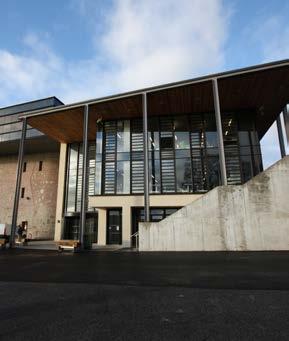
Visit the helpdesk on Level 1 of The Exchange Building, Penryn Campus email: studentservices@fxplus.ac.uk, call: 01326 370460 or visit: fxplus.ac.uk/student-support/the-compass for further information and access to the live web chat.

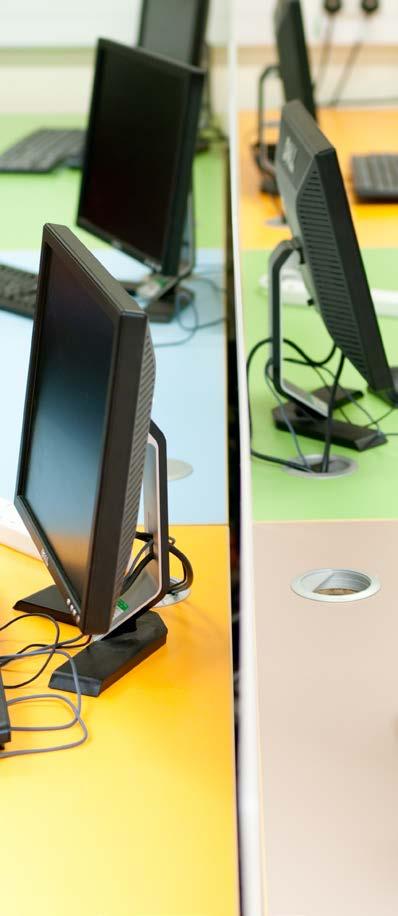
The Digital Hub on Penryn Campus is a good first point of contact for any digital issues including help with activating your IT account. They offer an in-person drop-in service and are also able to signpost to IT Support. You can find them just off the first floor of the Library towards the IT suite (ask at the Compass if you get stuck).
Once you have activated your IT Account you’ll be able to access the Digital Hub SharePoint where you will find a range of guides on the University’s Digital Tools and be able to book one-to-one appointments with the Digital Hub team: universityofexeteruk.sharepoint.com/ sites/TheDigitalHub
You will also be able to log IT issues (for example computer hardware or email problems) with Exeter IT at: uoeitservicedesk-apps.easyvista.com/ s/selfservice

Our app to support you throughout your university journey. Download it for free from the App Store and Play Store. Find out more at: exeter.ac.uk/students/myexeter
n View your timetable in a user-friendly format with real time information on class times, locations, and durations. Get directions to class or use the link to join online sessions.
n Take a look at the bookable and drop-in study spaces available on campus.
n Access University updates and visit the events tab to see what is happening on and off campus.
n Get easy access to the Exeter Learning Environment (ELE 2), the student record system, and your emails. There’s also a handy list of the campus facilities and student support available to you.
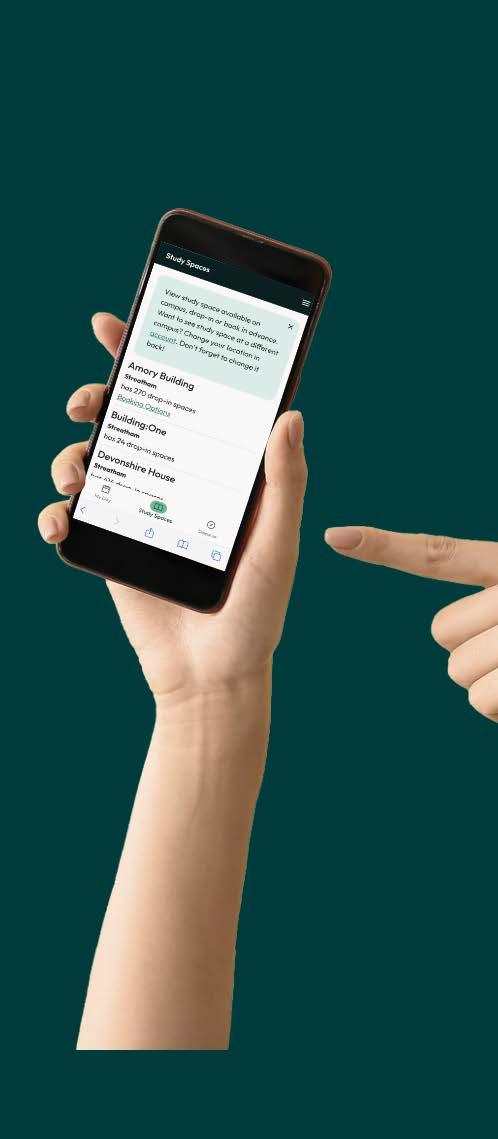
Some students are required to register their attendance, for example student visa holders. If you are asked to register your attendance using the MyExeter app, use the check-in button during your teaching sessions.
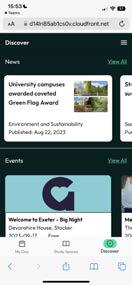
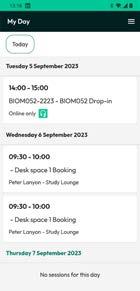


The Intercultural Café is a chance to meet new people and celebrate our different cultures in a relaxed and friendly environment. Students and researchers from across the universities in Cornwall are welcome. It runs every week during term time, usually on a Friday afternoon with a free hot drink and cake. Find out more including where to meet at: fxplus.ac.uk/events
Whether it’s a hot breakfast, a coffee, a lunchtime meal or afternoon tea, everyone is catered for on campus including meat, vegan, halal and gluten-free diets.
The Stannary Kitchen is the main eatery serving hot daily specials. Other campus outlets include the Sustainability Café which has a vegan/vegetarian menu, ESI Café and AMATA Café which all serve light lunches. Koofi serves snacks and pizzas alongside a variety of cold drinks and coffees plus Penryn Campus shop stocks food and essential items.
With so much on offer across our outlets there’s something to suit all tastes and budgets.
We care about the impact we have on the environment and use local, Westcountry, or Fairtrade produce whenever possible. We encourage you to bring your own reusable cup into our cafés.
Please talk to our catering team if you have any specific dietary or allergen needs.
The Stannary Bar is your social hub on campus. Regular evening entertainment is provided with music, games and student nights to enjoy. Large music gigs are also organised where the whole of the Stannary is transformed into a club venue.
For details about all on-campus events, including large gigs, visit: fxplus.ac.uk/events
For news, updates and offers follow: @foodanddrinkoncampus @stannary
If you are interested in sustainability, you can find out more about what the University is doing and how you can help us achieve our target of carbon net zero.
n Our Climate Companion pack is a good place to start, it gives you ideas on what you can do and why. Access it at digital.exeter.ac.uk/climatecompanion-pack
n Confused about what to recycle and where? Page 34 has a great guide.
n Want to volunteer? Look out for groups and societies you can get involved in via the SU thesu.org.uk/activities or through initiatives like the Swap Shop or Chaplaincy gardening time. They’re normally listed at fxplus.ac.uk/events
n Interested in adding to your CV? Green Consultants is designed to give you the additional skills and experience you may need to work in the sustainability sector, visit exeter.ac.uk/students/ careers/employability-schemes/greenconsultants
You can find information on sustainability on our Cornwall Campuses at exeter.ac.uk/cornwall/ sustainability
Keep up to date by following the Sustainability team on @uoesustainability


You can get 1/3 off train tickets with a Young Person’s Railcard. So get away from essays for the day and explore what the beautiful South West has to offer. Visit 16-25railcard. co.uk for more information.
There are great transport links to get you around the local area and further afield.
Walking or cycling to campus is beneficial for our health and wellbeing, reduces stress and is environmentally friendly. We have bike shelters, storage areas and free bike maintenance areas plus e-Bikes available to hire. There are also plenty of clean showers and changing areas for you to use across campus.
Visit: fxplus.ac.uk/campus-navigation/ travel-and-transport/cycling
First Bus run the main bus lines across Cornwall. We recommend downloading the First Bus App to get access to bus times, live bus arrival updates to avoid waiting, space availability on buses and discounts. Go Cornwall Bus look after local bus services across Cornwall. You can use your bus ticket on any bus* across Cornwall, no matter what colour it is, or who’s driving – it’s one, big joined up network.
Visit: transportforcornwall.co.uk for the details.
Penryn Station is a 10 minute walk from campus. A trip to Falmouth takes 10 minutes by train, while Truro and access to the main line is just 20 minutes away. Visit gwr.com for more information.
We don’t recommend bringing a car to University. There is no parking available at any of our residences except for Blue Badge holders. Why not use one of the many sustainable means of transport available instead?
*Excludes Falmouth and Exeter University passes.
The best way to stay safe at night is to stick with your friends. It happens rarely, but students have been involved in incidents walking home alone.
Always remember:
n During darkness you are safest in well-lit and busy areas. Avoid badly lit car parks, underground walkways and open areas.
n Be careful of your belongings.
n Ensure you have a safe route planned home.
n If you find yourself in trouble the best form of defence is to get away and head towards busier areas.
n If you are trapped, bring attention to yourself and make as much noise as possible by shouting or screaming.
n Call 999 as soon as it is possible to do so and never feel ashamed to report something.

Visit: exeter.ac.uk/students/stay-safe for more tips to stay safe.


Cornwall is generally a safe place to live but it’s always best to be aware of potential risks and take some precautions.
n Drink spiking is a crime and carries a maximum 10 year prison sentence. Find out more at devon-cornwall.police.uk/spiking
n Drink spiking includes the act of adding alcohol, not just other unwanted chemicals, to a drink.
n Don’t leave your drink unattended and never accept a drink if you haven’t seen it being poured/opened.
n If you start to feel strange or more drunk than you should be, then get help straight away.
n Many bars will be able to test your drink to determine if it has been spiked including the Stannary bar.
The Stannary Bar on Penryn Campus and a number of other venues in Falmouth and Penryn operate the ‘Ask for Angela’ scheme. (It’s normally discreetly signposted.) Anyone in a vulnerable or uncomfortable situation that needs help can ask “for Angela” at the bar or to a member of staff who will then discreetly ensure they are helped. This might be reuniting them with a friend, seeing them to a taxi, or by calling venue security and/or the police.
SafeZone
Download SafeZone, your free on-campus safety app. It provides a quick and easy way for you to contact the campus safety and support team, if you ever need urgent help while you’re on Penryn Campus.
Visit: fxplus.ac.uk/safezone
Sexual Consent
Consent means that you give permission, or that someone has given you permission to engage in any intimate activity or sex. Any sexual contact without consent is illegal.
Consent is an essential part of healthy relationships and it’s really important to understand when it has been given. Consent can be retracted at anytime.
In addition to verbal responses, recognising and accepting non-verbal cues and body language are just as important when gaining consent.
All students have to complete the mandatory Consent training module found here: ele.exeter.ac.uk/course/ view.php?id=12256
Find out more about Healthy Relationships here: exeter.ac.uk/students/staysafe/healthy-relationships

You can get advice and support from us at any time.
Find out more on the University’s Sexual Violence support pages here: exeter.ac.uk/students/wellbeing/ cornwall/resources/sexualviolence

When you’re online it’s important to stay safe and make sure you don’t share things that could put you in danger:
n Use secure and unique passwords for all devices and apps.
n Keep your antivirus software up to date.
n If you receive an email from a stranger, think before clicking on a link or an attachment – it could contain a virus.
n If you believe that your smartphone or computer has been hacked or compromised, stop using it immediately and get advice from a repair shop.
n Be careful who you chat to, if somebody you don’t know adds you as a friend, ignore them and delete their request.
n Don’t share personal information like your address or phone number with somebody you don’t know. Most importantly don’t share bank details.
n Think before you post something on social media.
For more details: exeter.ac.uk/about/speakout/ support/guidanceoah/onlinesafety
Opportunist thieves often target student houses:
n Always lock your windows and doors. Sounds obvious but if you don’t then you’re more likely to be burgled.
n Keep valuables out of sight, away from windows or doors and never leave them on show.
n Security-mark your valuables. Write your name and HOME postcode on them with a UV pen. Register your items for free at immobilise.com – so they can be traced back to you if they’re recovered.
n Don’t keep spare keys ‘hidden’ anywhere obvious. That includes the shed and garage as well as the disused flowerpot by the front door.
Insurers often don’t pay a claim unless you’ve done the above.
Reporting crime or getting help is easier than ever, and the police will be happy to help.
You can:
n Email: 101@dc.police.uk or phone 101
n Report online and find answers to most questions at devon-cornwall.police.uk
n Sign up to Devon and Cornwall Alert, for all the latest events, crime information and help at alerts.dc.police.uk
n In an emergency always call 999
Over the holidays student houses can be vulnerable to burglary, so take your valuables with you, put them in secure storage or ask a friend to look after them.

“I had my laptop nicked last year – someone just opened my unlocked ground floor bedroom window and grabbed it. It wasn’t security marked and I had loads of personal stuff on there – including my dissertation…”
3rd Year Student

Ahate crime is any crime perceived to have been motivated by hostility or prejudice. It can be committed against a person or their property based on:
n Disability
n Race or ethnicity
n Religion or belief
n Sexual orientation
n Gender identity
n Or any part of someone’s personal identity
Hate crimes can include things like:
n Being called names or other forms of verbal abuse
n Being sent offensive letters, emails or text messages
n Being attacked or threatened with violence
n Having your property interfered with or damaged
If any of these things are happening to you, you should report them to the police and also report them to the University at fxplus.ac.uk/speakout. The University and police take reports of hate crime seriously. We have a zero tolerance approach to hate crime and work together on this.
Everyone has a right to be treated with dignity and respect. Please use fxplus.ac.uk/speakout to report any unacceptable behaviour that you witness or experience, such as bullying, intimidation, harassment or discrimination. If, for example, you experience racism, sexism or homophobia then please report it.
There are three ways you can do this – anonymously, informally and formally. Please report any incidents so we can support those who are affected and get a clear picture of what is happening in our community so we can take action. Report confidentially at: fxplus.ac.uk/speakout
All reports, that are not anonymous, are followed up by a member of the Equality, Diversity and Inclusion (EDI) team within three working days. You can have an informal and confidential conversation, to discuss support and next steps. For further advice, guidance and/or an informal conversation, please contact the Equality, Diversity and Inclusion team at edi@exeter.ac.uk.
If it is an emergency where life is threatened, people are injured or offenders are nearby and you need an urgent response phone 999.
To find out how to report a hate crime to the police, or anonymously through a third party, visit the website: exeter.ac.uk/students/stay-safe


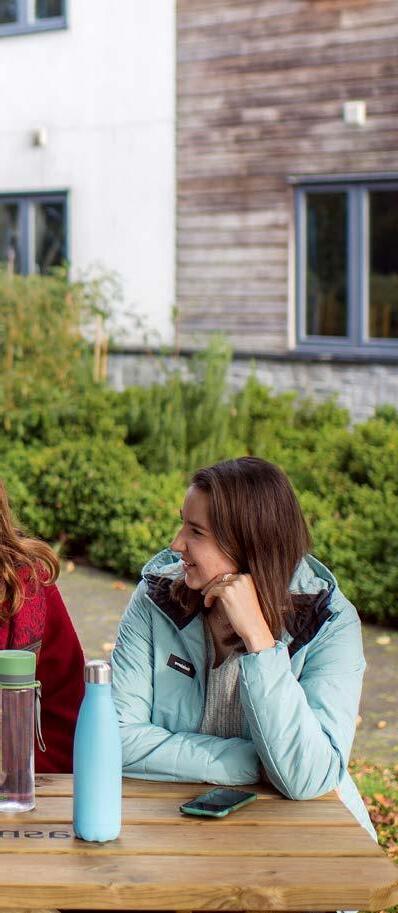

Reduce the risk of fire and know what to do to help keep yourself and others safe.
In the event of a fire… get out… stay out… Call 999.
n If you hear a fire alarm leave the building immediately and don’t go back in until it is safe to do so.
n Make yourself aware of the way out of the building and don’t obstruct doors or corridors.
n Never remove or cover your smoke alarm or carbon monoxide detector.
n Take care when cooking, particularly with oil.
n Don’t get distracted, keep an eye on your cooking.
n It is not safe to cook when you have been drinking alcohol.
n Charge your devices on a hard surface and never on a carpet, chair or bed.
Find out more online at Cornwall Fire and Rescue service: cornwall.gov.uk/ fire-and-rescueservice/keepingsafe/fire-safety/ fire-safety-at-home and exeter.ac.uk/ students/stay-safe
n Extension leads generate heat so should be used carefully. Do not overload sockets.
n Check your accommodation contract for any do’s and don’ts like smoking, vaping and candles.
n Contact your landlord if you have any fire safety concerns.
We understand that living in shared accommodation with new people can be a very big change and that living with friends you have known for a while can also be challenging.
The following advice has come from students who have lived in shared accommodation before:
n Meet regularly: Students in shared accommodation who meet regularly have a much better time. House/flat meetings can help air tensions, create an atmosphere of support and help to tackle practical issues more easily (like paying bills, addressing noise, etc.)
n Create a rota: Agreeing a rota for domestic tasks can be very helpful. In our experience, jobs like cleaning the house, taking out the bins etc. can quickly escalate and cause households to argue. Start with a plan!
n Ask for help: If things go wrong, it is also important to know when to ask for help. The following people can help you: info@thesu.org.uk – if you have a question about your contract, finances or you are having some problems with housemates. studentservices@fxplus.ac.uk – if you have any concerns about your wellbeing or the wellbeing of other students at your address.
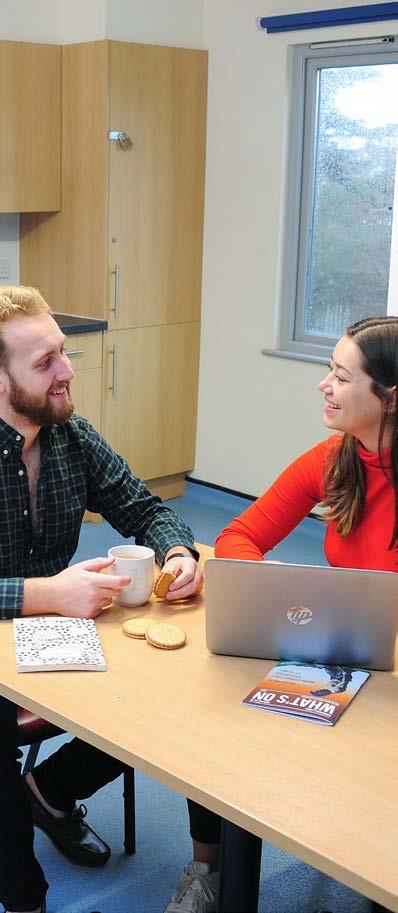


We remind you that while you live in Penryn, Falmouth and Truro, as well as being part of the University, you are part of the local community.
We’ve heard some lovely stories from residents about students showing them great kindness. Please continue to be mindful and considerate in the way you act; it makes a bigger impact than you realise.

Please also be aware that students must abide by our ‘General Student Regulations’ which sets out the personal commitments we must all make to keep our community safe. exeter.ac.uk/ staff/policies/calendar/part1/otherregs/genregs
If you’re moving from University accommodation into the community for the first time, this can be an exciting time.
Renting a house or flat with friends will be a big part of your university life and it’s a great opportunity to meet new people. However, it comes with new responsibilities and new neighbours.
It’s always important to maintain good relations within your community.
People in Cornwall are generally friendly and neighbourly. If you come from a big city you may not be used to talking to someone on a bus or walking by, but it’s quite common down here. So don’t be afraid to say hello.

This section of the guide has advice for living in the community, from how to introduce yourself to your neighbours to what to do with your rubbish and recycling.



Think of yourneighbours when walking to and from your property, particularly late at night. Street noise, or ‘Transient Noise’ can cause just as much disturbance to neighbours as sound equipment – particularly for those with children, or early morning commitments.work
The vast majority of students living in Cornwall have a really positive relationship with their neighbours.
When living off-campus it is important to be aware of the following facts:
n Student regulations clearly state that students are expected to have consideration and respect for neighbours. The University can, and does, explore conduct issues that occur outside the campus boundaries. We will also provide advice and support when students are the victims of issues that arise.
n Students also report noise/disturbance from other properties. It is important to consult with your neighbours before organising a party/social – including both your student and non-student neighbours.
n Excessive noise from any sound equipment can lead to a statutory noise abatement notice, which could lead to conviction/seizure of the equipment.
n If hiring DJs, you may also need to consider the need to apply for a Temporary Event Notice Licence.
See our party checklist on page 30 for how to host a gathering that respects your neighbours.
ASB is defined as “Behaviour by a person which causes or is likely to cause harassment, alarm or distress to one or more persons not of the same household as the person”. (Antisocial Behaviour Act 2003 & Police Reform and Social Responsibility Act 2011).
Please remember that noise travels – follow the checklist to reduce the chances of a statutory noise conviction from the Council or formal investigation by the University.
Note that the checklist below applies to any significant gathering/party or pre-drinks.
Following the checklist below will also demonstrate how much you respect those living in your community.
n We have consulted with neighbours living all around our property two to three days before our gathering.
n We have ensured that start and finish times have been agreed with neighbours and, if neighbours are not at home, we have issued a letter with full details.
n We have taken into account our neighbours’ working hours/study commitments and/or childcare priorities.
n We have made preparations to keep windows closed, reduce noise/base levels and move sound systems away from walls.
n We will manage guests appropriately and recognise that all tenants are jointly responsible for the conduct of any visitors.
n We will ensure that guests/tenants will not cause disturbances outside of our property – particularly at the start and end of our social.
n We have ensured that all tenants living at our address are fully consulted on any socials being arranged – even if only a minority of tenants are involved.
n We will not use high-bass/high decibel sound systems and acknowledge that increased noise levels could result in the issue of noise abatement notices.
n We will not permit student clubs/ societies to host large scale socials or pre-drinks at our address and accept that all registered tenants will be liable if such socials go ahead.
Please note – even if you follow the checklist, it does not give you permission to make excessive noise.

The University’s Community Liaison Team has ten years’ experience advising on noise concerns. Here are their top tips:
n Neighbours who are on first name terms are far more likely to talk to you if there is a problem – and far less likely to raise formal concerns with the council or University. Introduce yourself to your neighbours – popping a note through the door followed by a chat over the fence or on the phone will help break the ice.
n There is no legal cut-off time for when ‘noise’ can or can’t occur. The best way is to consult with neighbours about what time limits work for them. Being able to evidence this will reduce the likelihood of a negative outcome.
n Students are increasingly complaining about noise from other students. Be cautious about student societies/clubs asking to host social events at your address, as guests are less likely to regulate their noise. If a society social generates concern the University will instigate a meeting with society members and all tenants of the host address. Important: Are you feeling pressurised into hosting a social/party at your address? Contact Student Services at exeter.ac.uk/students/wellbeing/ cornwall/appointments
Here’s the essential checklist of stuff to do now you’ve arrived in your new home:
n Meet your neighbours – It’s really important to get to know your neighbours. Why not introduce yourself by putting a note through your neighbours’ letter boxes with your names and a phone number to arrange a chat. Don’t forget to include the neighbours who live behind your home as well as the ones on either side.
n Check your inventory – your landlord should provide you with an inventory (if they don’t, make sure you write your own) so that you can both agree on the initial contents and state of the house.
n Read your meters – if your gas and electricity bills are quarterly you’ll need to do this asap so you don’t risk getting charged for the previous tenant’s fuel use. Contact your gas and electricity providers to give them the reading and ask them to put the names of all the tenants on the bill. Check your meter even if your bills are included.
n Take date-stamped photos of every room –especially anything that’s not in good, clean condition. This means you’ll have evidence of what the house was like when you got the keys, which could save you issues later.
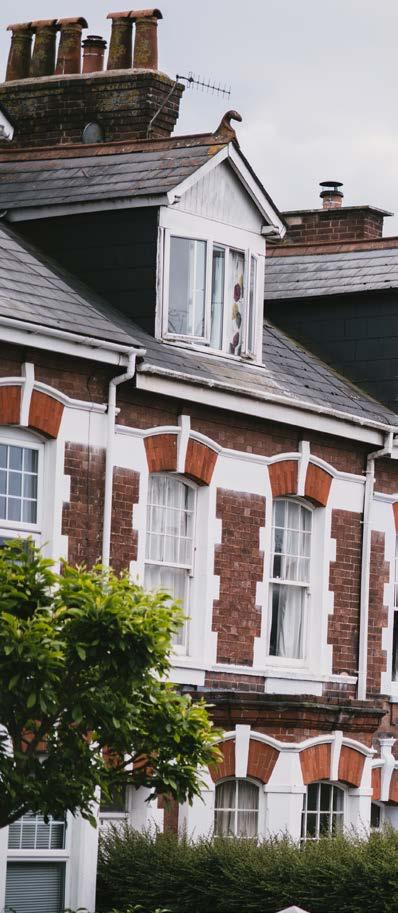
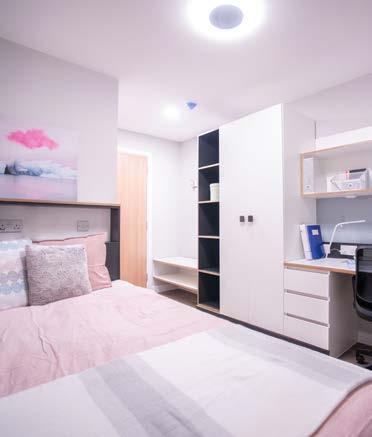

n Something wrong? If it’s a dodgy doorknob or a window that won’t shut properly – inform your landlord in writing and keep a copy. List exactly what’s wrong and agree a reasonable deadline for when it should be sorted.
n Prescribed information: your landlord is legally obliged to give you certain information such as the gas safety certificate, Energy Performance Certificate and deposit information. Most will do this without a problem, but if you are unsure, ask for help. Visit thesu.org.uk/advice/accommodation
n Make sure to pay your TV licence if you watch TV live on any device or catch up on programmes on iPlayer. Unsure if you need one? Check: tvlicensing.co.uk
You can use Studentpad to search for student houses, flats and lodgings in Cornwall.
Visit: cornwallstudentpad.co.uk/ accommodation for more information.
The lovely people at the Falmouth & Exeter Students’ Union (the SU) can give advice, information and support on a whole host of housing queries and questions about university life.
See their web pages at thesu.org.uk/advice/ accommodation for more information.
Rubbish/recycling collection is likely to be different to what you’re used to.
n Household rubbish (non-recyclables) is currently collected weekly – find out when your collection is by visiting the Council’s website at cornwall.gov.uk
n All houses in Falmouth get a free seagull-proof bin bag. No bag? Collect one (free) from Glasney Lodge or the Falmouth Information Service on the Moor
n Recycling is collected every two weeks via a recycling box and three reusable sacks. Find out where to get them and what goes in them at cornwall.gov.uk/ rubbish-recycling-and-waste
n Doorstep food waste recycling will start in the Falmouth and Penryn area in 2025 visit: cornwall.gov.uk/rubbish-recycling-and-waste/ new-food-waste-recycling-and-rubbish-service to find out more.
Recycling available on Campus
Food waste and tetra pak cartons (oat milk, pringles etc.) can be recycled on Penryn Campus. We also have a special recycling bin outside the Sustainability Café that can take pens, empty medicine packaging and even Christmas decorations.
Vapes can be deposited in the special bin in the campus shop, the old batteries within them are currently being used to power robot mice!
Cornwall Council do not currently recycle food and tetra paks from the doorstep, but please feel free to bring these to campus to be recycled. Electronic items (WEEE) can also be recycled on campus, email recycling@fxplus.ac.uk, or follow @fxrecycling.



Falmouth Town Council and Safer Falmouth ask everyone to help keep Falmouth’s beaches safe for residents, visitors and marine life. Problems such as open fires, dog fouling and littering can threaten the public’s safety and could lead to the loss of Blue Flag status.
By working together, we can ensure a cleaner and greener environment for everyone. The Sand Safe campaign aims to improve beach safety by promoting three simple rules:
1. No open fires on the beach – if permitted, use a BBQ instead. Don’t leave it unattended or forget to dispose of it safely. Often BBQ bins are provided.
2. Clean up after your dog and follow summer dog restrictions.
3. Bin your litter and leave only footprints.
Please report any concerns about safety on Falmouth beaches to admin@falmouthtowncouncil.com or call 01326 315559.
We know it seems far away now but the year will fly by and if you’re in private rented accommodation it’ll soon be time to leave your house again.
Here are some things to remember:
n Change your address two to three weeks before the move so you don’t miss out on any essential post. Royal Mail can provide a re-direct service for a charge.
n Let utility providers like gas, electricity, water, broadband etc know your date of departure, otherwise they’ll keep charging you. Try to call them as soon as you know your moving out date and take meter readings on the day you leave.
n Check the photos from when you moved in to ensure that everything is still in order. This includes going through the house inventory.
n Too much stuff? Old pots and pans you don’t need? Take your items to a charity shop – remember to check that they are able to accept donations.
n Clean up! Book a day with all your housemates to clean and put furniture back in the right place before you move. Share the work, don’t leave it all for the last person to do.
n Speak to the landlord to set up an inspection date when you are all still around to inspect the house together.
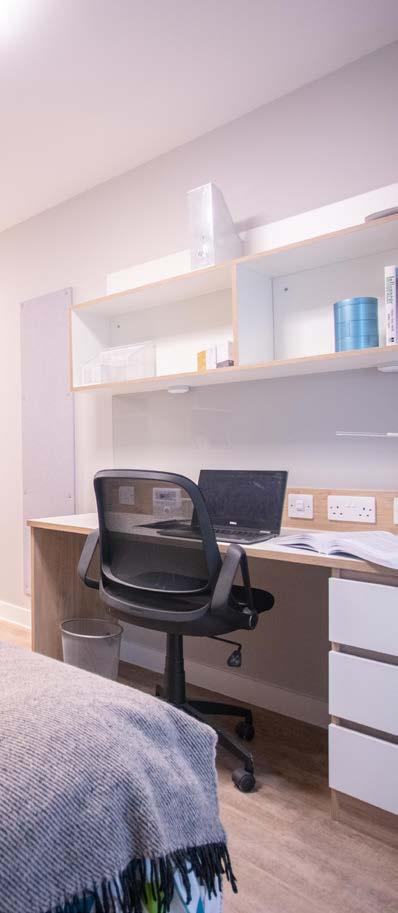

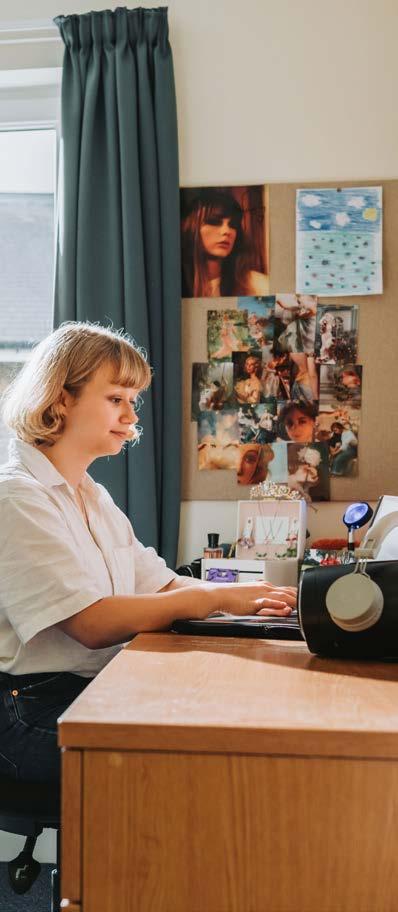
We know you may be feeling anxious about the cost of living, and managing your money at uni. Here are a few ideas to help you keep on top of your finances.
1. Consider opening a student bank account
Different banks and bank accounts offer different benefits and incentives. moneyhelper.org.uk and moneysavingexpert.com/students have advice on choosing the best account for you.
2. Work out your budget
You can find a number of free budgeting tools online including moneyhelper.org.uk/en/everyday-money/ budgeting/budget-planner. The Students’ Union can also help you with budgeting advice, visit: thesu.org.uk/advice
3. Make sure you’re getting all you’re entitled to Depending on your circumstances you may be eligible for extra financial support, bursaries or benefits. Find out more at exeter.ac.uk/students/financialhelp or ask your Students’ Union Advice Service.
4. Look out for deals and savings
Lots of places offer student discounts and special deals. Check out savethestudent.org/student-deals for the latest deals and freebies.
5. Up your income
We have information and advice to help you manage your finances, and support available if you’re struggling, on our Cost of Living web pages: exeter.ac.uk/students/ costofliving/cornwall
Consider a part-time job if you can fit it around your studies. It could help you gain experience and earn money while studying, visit: exeter.ac.uk/careers and search ‘help finding part time work’ or see page 11.
6. Don’t be tempted to use loan sharks, illegal money lenders, or quick-money schemes that may not be legitimate. You could get scammed or end up in serious trouble.
If you’re struggling, you can apply to our Success for All Fund for help during your time at Exeter, visit: exeter.ac.uk/ students/financialhelp
7. Deal with your debt
Although it can be stressful, problems with debt only get worse if you ignore them. Talk to your creditors about your situation and try to negotiate an affordable payment plan. If you’re struggling with paying your tuition fees, or the rent on your University accommodation, talk to us. You can contact us through the Student Information Desk (SID) at exeter.ac.uk/students/sid
The SU Advice Service, thesu.org.uk/ advice/finance, can also give you advice on managing your debt or organisations like stepchange.org/debt-info/studentdebt-help may be able to help.
8. Ask for help
If you’re worried about your money, or dealing with debt, don’t keep it to yourself. Please speak to your Students’ Union Advice Service. They can help find the right advice and support for you. If money worries are affecting your mental health don’t forget you can access support, visit: exeter.ac.uk/ students/wellbeing/cornwall



In an emergency, dial 999 and ask for the relevant service: Ambulance, Fire, Police or Coastguard
Accommodation Office
01326 253639 accommodation@fxplus.ac.uk
Campus Safety and Support 01326 255875 safetyandsupport@fxplus.ac.uk
Campus Safety and Support 24 Hour Emergency line: 01326 254444
Compass Helpdesk
Fire Safety
Info Point
01326 370460 studentservices@fxplus.ac.uk
Emergencies: 999
24hr fire safety advice: 0800 358 1999
01326 371800 info.penryn@exeter.ac.uk
NHS Direct 111 111.nhs.uk
Noise nuisance – Community and Environmental Protection
Police response (including disturbances in the street, crime or sexual assault)
Safer Cornwall (including issues with anti-social behaviour)
0300 1234 212 publicprotection@cornwall.gov.uk
Emergencies: 999 Non-emergencies: 101
0300 123 4232 safercornwall.co.uk/contact-us
Samaritans 116 123 samaritans.org
Student Support
01326 370460 studentservices@fxplus.ac.uk
Students’ Union Advice info@thesu.org.uk
University-related community issues
01326 370737 community@fxplus.ac.uk
There are lots of ways that you will receive updates from the University. Key communications that are tailored to Cornwall Campuses are:
A weekly newsletter for students in Cornwall sent by email on Mondays, during term time, and posted here: exeter.ac.uk/students/news/inbrief
University of Exeter, Cornwall social media accounts share student information, news, updates and events. Follow @UniExeCornwall on Campus
You can find updates on Penryn Campus food outlet opening times or any notices regarding disruptions: fxplus.ac.uk/ service-status
